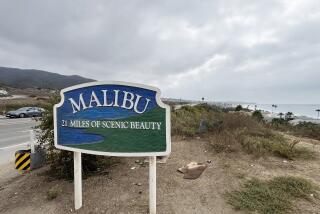Earthquake: The Long Road Back : Park Playgrounds Filled With Patients : Assistance: Injured people who are unable or too afraid to visit hospitals get help at makeshift treatment centers.
- Share via
Across from the monkey bars, in a grassy corner of West Valley Park, medical workers set up a makeshift treatment room for quake-weary residents.
They come almost instantly. Mothers with their babies, teen-agers and their friends, students and day laborers. Many have not received medical care since the quake turned their world upside down--and left them spending chilly nights outdoors in a crowded park.
“Something fell on my back and it still hurts,” said 19-year-old janitor Victor Albizures, 19, who was working at the Northridge Fashion Center during the quake.
“I was lucky. My friend lost his legs.”
Although hospitals and shelters provide medical care, many residents camped in parks and in vacant lots are unable or are too fearful to venture to such facilities, Los Angeles City Councilwoman Laura Chick said.
“It’s been a frustration,” she said. “If you don’t tend to minor things, they develop into serious things.”
After hearing of sick babies, a diabetic woman living in the park who couldn’t find insulin, and other cases, Chick and her staff organized a team of doctors and nurses to treat residents at parks in the west San Fernando Valley. Using donated medical supplies and the barest equipment, the doctors and nurses listened to their stories and treated their ailments.
Just days away from giving birth to her first child, Esmeralda Torres, 22, has spent the last four nights sleeping in Reseda Park. She has had pain in her abdomen, she said, and during a strong aftershock Friday she fell and hurt her ankle.
“Can you walk?” the doctor asked in Spanish.
“It hurts a lot,” the woman said.
“Do you feel your baby moving normally?
“Yes,” the woman said.
After examining Torres, the doctor bandaged her foot and ankle, assured her that the sprain would heal and wished her good luck.
Leaning heavily on a stick, Torres walked slowly to her cousin, who was waiting with a baby stroller--the closest thing they could find to a wheelchair. Torres sat in the stroller and her cousin wheeled her back to their spot in the park.
“Anxiety, headaches, a lot of colds, chest discomfort--we’re seeing all kinds of people,” said Dr. Michael Genova, a volunteer from the Northridge Family Practice Training Program.
“Some really need help, some just need to be assured that they’re OK,” he said.
Since Monday, 11-year-old Yesenia Becerra said she has been “real panicky” and “feeling sick.”
“My stomach keeps on hurting every time there’s an earthquake,” Yesenia said sadly, her cheeks flushed. “I don’t want to eat because I feel like throwing up.”
Yesenia, her sister, Maribel, 17, and the rest of the family have slept on couches in the back yard of their home in Reseda since the quake.
The earthquake, the seemingly endless aftershocks and night after night sleeping outside are starting to take a physical and emotional toll on the family. Maribel, a student at Reseda High School, has tried to be strong for her family.
“I was calming them, telling them that it was going to be OK,” she said, holding their baby sister, Claudia, who was examined by a doctor. Maribel told them “that God would take care of us.”
“I’m really scared for my aunt,” she said. “She’s pregnant and every time there’s an earthquake, she starts crying.”
Olga Murillo hurt her shoulder, knee and arm as she tried to escape from the rubble of her second-floor condominium.
“I jumped out a window,” she said. “(The doctor) said I have blood on the knee but it’s going to go away. Thank God it’s not serious. I could have broken my legs.”
Doctors at the park gave her pain medication.
“I have Kaiser but it’s easier to come here,” she said. “The other day I went there and I waited three hours. I came here and they saw me right away.”
Many of the volunteers were doctors, residents, nurses and medical assistants from the Northridge Family Practice Training program at Northridge Hospital Medical Center. Nurse practitioner Karen K. Proctor, who works with the Los Angeles Unified School District, had been doing paperwork since the quake closed the schools. But she felt the desire to do more.
“I’d rather be with our kids,” Proctor said. “I think they need us.”
Paula Elefante, a member of Chick’s staff, even handed out lollipops to children who saw the doctors.
“Lollipops are things children find comfort in,” she said. “These are such uncomfortable times.”
Even as they bandaged, comforted and counseled, some of the medical workers said their greatest contribution might have been their mere presence at the park.
“What’s helping them the most is knowing that people still care,” Genova said.
More to Read
Sign up for Essential California
The most important California stories and recommendations in your inbox every morning.
You may occasionally receive promotional content from the Los Angeles Times.










